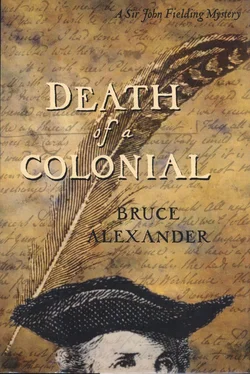Bruce Alexander - Death of a Colonial
Здесь есть возможность читать онлайн «Bruce Alexander - Death of a Colonial» весь текст электронной книги совершенно бесплатно (целиком полную версию без сокращений). В некоторых случаях можно слушать аудио, скачать через торрент в формате fb2 и присутствует краткое содержание. Год выпуска: 1999, ISBN: 1999, Издательство: Putnam Adult, Жанр: Исторический детектив, на английском языке. Описание произведения, (предисловие) а так же отзывы посетителей доступны на портале библиотеки ЛибКат.
- Название:Death of a Colonial
- Автор:
- Издательство:Putnam Adult
- Жанр:
- Год:1999
- ISBN:9780425177020
- Рейтинг книги:3 / 5. Голосов: 1
-
Избранное:Добавить в избранное
- Отзывы:
-
Ваша оценка:
- 60
- 1
- 2
- 3
- 4
- 5
Death of a Colonial: краткое содержание, описание и аннотация
Предлагаем к чтению аннотацию, описание, краткое содержание или предисловие (зависит от того, что написал сам автор книги «Death of a Colonial»). Если вы не нашли необходимую информацию о книге — напишите в комментариях, мы постараемся отыскать её.
Death of a Colonial — читать онлайн бесплатно полную книгу (весь текст) целиком
Ниже представлен текст книги, разбитый по страницам. Система сохранения места последней прочитанной страницы, позволяет с удобством читать онлайн бесплатно книгу «Death of a Colonial», без необходимости каждый раз заново искать на чём Вы остановились. Поставьте закладку, и сможете в любой момент перейти на страницу, на которой закончили чтение.
Интервал:
Закладка:
“Why, it will all go to the King, will it not?”
“You know that because I told you so, but most do not. It is a custom which has the strength of law. There is no wish to call attention to it, because to do so could promote unrest among the people — and well it might, for it is a bad custom.”
“But if not to the King,” said I after no more than a moment’s consideration, “to whom should the wealth of a condemned criminal go!”
“Well, to the poor, to the church,” said Sir John. “I can think of dozen institutions and charities more deserving than the royal pocket. Do you not see the pernicious danger in it, the possibility of encouraging corruption and tyranny, lad? With the power and influence that a King has, it might be possible for him thus to rob his nobles of all their lands and wealth.”
Naive lad that I was, I could scarce believe my ears. “You mean, by arranging their conviction?” said I, holding my voice down as my indignation rose. “Why, sir, King George would never do such a thing! He is as good and just a monarch as could be.’’
“I agree,” said Sir John. “ He would not, but that does not mean that another would be equally restrained by a sense of what is good and just. We need not look too far back in history to find kings of Britain who were capable of great misdeeds. “
“Oh,” said I after a long pause, “I see your point.”
“At long last,” said he. “As I have told you before, Jeremy, to be a lawyer, you must learn to think as a lawyer.”
“Yes, Sir John.”
“I myself think as a lawyer, and being of that habit of mind, I greatly fear that the sole purpose of this commission is to ensure that the King gets his fair share of the fortune — which is to say, all of it.”
Thus did we come to Bloomsbury Square and the residence of the Lord Chief Justice. By the time we had arrived, the magistrate had made it clear that he wished me with him at this initial meeting, if for no other reason than there would be a few present whom he had never met and he wished me to give him physical sketches to match his voice impressions. He instructed me to take a place directly behind his chair, close enough that all I need do was bend to him to hear his instructions or answer his requests.
The butler, my old adversary, threw open the great door in response to my persistent knock. Seeing my face first, he prepared to make his usual effort to send me swiftly away; but then did he perceive Sir John’s face and figure behind me, altered his expression, and bowed us in.
“Right this way, Sir John,” said he. “The gentlemen will gather in the library.”
“Are we the first?” asked Sir John.
“Among the first. Lord Mansfield awaits you there, with Sir Patrick Spenser.”
“Ah!” said Sir John. “The Solicitor-General, no less.”
“Yes, sir,” said the butler, “and another gentleman, a certain Mr. Trezavant, who, I believe, holds the office of coroner of Westminster.”
This exchange had taken us as far as the library door, which was closed to us. Rather than open it directly, the butler poised to knock. Yet just then the door swung open, and the Lord Chief Justice appeared in company with one who was decidedly not Mr. Trezavant. The unrecognized gentleman framed in the doorway was tall, slender, and was dressed, as one might say, at the very peak of style. Him I took rightly to be Sir Patrick Spenser, a baronet and, as Sir John had observed, Solicitor-General to the King.
As the butler retired from the door, Lord Mansfield — that is to say, the Lord Chief Justice — stepped forward and introduced the two, Sir Patrick, who looked to be a rather prideful man, bobbed his head politely and extended his hand to grasp Sir Johns; the two wiggled hands in a more or less cordial manner. The younger man murmured something which I for one was unable to hear properly. Yet Sir John evidently had no difficulty, for he gave emphatic agreement.
“Oh, indeed,” said he. “I should think that most important.” Then, frowning, he added, “But you are not remaining?”
“I think not,” said Sir Patrick. “My part in this was simply to see that a commission was formed. That, Lord Mansfield has attended to admirably. I shall leave matters in his hands — and your own — with confidence that all will be handled effectively and discreetly.”
“But what — “ said Sir John. (Though he never got further, it seemed to me he had begun a protest of some sort.)
“I do hope, Lord Mansfield,” said Sir Patrick, addressing the Lord Chief Justice though staring straight at me, “that it will be made clear to all of those in attendance today that the purpose, even the existence of this commission, is to be kept in strictest confidence. “
It was almost as if he had been witness to my blunder in Drury Lane. There was no question in my mind but that his caution was meant for me in particular. But was it what he had said, or how he had said it, that led me to such an unlikely suspicion? His soft voice did little to hide his insinuating and slightly threatening manner.
“But I must be off,” said Sir Patrick. “I shall perhaps look in on you again sometime in the future, when there are some developments in the matters at hand.” With one quick look, he surveyed all present. “Goodbye, then.”
“Joseph,” said Lord Mansfield to his butler, “show Sir Patrick out.”
And the two were gone in a trice.
“Come in, Sir John,” said the host. “It should not be long until all are present.”
Nor was it. The prompt arrival of two more members of the commission excused Sir John from the onerous task of making talk with Mr. Trezavant, the coroner, for whom he had little respect. Mr. George Hemmings, a prosperous solicitor specializing in matters of property, and Mr. Hubert Dalrymple, a barrister known to be a close friend of Sir Patrick Spenser’s, evidently fulfilled the commission’s roster. Perhaps only Lord Mansfield knew that (Sir John did not), and he signaled his satisfaction that their number was complete by stepping smartly before them, calling them to order, and asking if anyone present might wish to serve informally as secretary and take notes on the proceedings. It was a task none seemed to wish. As Lord Mansfield surveyed the room, his glance fell upon me, who stood as I had been instructed, immediately behind the chair occupied by Sir John in an attitude of attention.
“What about the lad here?” said Lord Mansfield, pointing in my direction. “Your lad, Sir John. Can he write? Has he letters?”
“He is well read, and I’m told writes a very handsome hand. Nevertheless, I believe you would be ill advised to use him — or any other, for that matter — to keep a record of this meeting.”
“If I understand you aright, you think it wrong to keep minutes of this meeting?”
“Just so,” said Sir John. “Sir Patrick Spenser has dinned into us the need for confidentiality, even secrecy, regarding whatever is done or discussed here, and I think it would be acting against his instructions if a record of our meetings were to be kept.”
“I don’t quite follow you,” said Lord Mansfield.
“Well, simply put, if there is a written record, then there is always a chance that it may fall into the hands of those from whom Sir Patrick would keep it. If we rely upon our memories, there is no such chance.”
“Ah, yes, I understand now. But I’m afraid I must disappoint you.”
“Oh? In what way?”
“It was Sir Patrick himself who particularly requested that a record of this and future meetings be kept so that he may pass a copy on up to other interested parties.”
“The King, no doubt,” said Sir John rather sourly, “and perhaps the rest of his family, as well. “
Читать дальшеИнтервал:
Закладка:
Похожие книги на «Death of a Colonial»
Представляем Вашему вниманию похожие книги на «Death of a Colonial» списком для выбора. Мы отобрали схожую по названию и смыслу литературу в надежде предоставить читателям больше вариантов отыскать новые, интересные, ещё непрочитанные произведения.
Обсуждение, отзывы о книге «Death of a Colonial» и просто собственные мнения читателей. Оставьте ваши комментарии, напишите, что Вы думаете о произведении, его смысле или главных героях. Укажите что конкретно понравилось, а что нет, и почему Вы так считаете.












